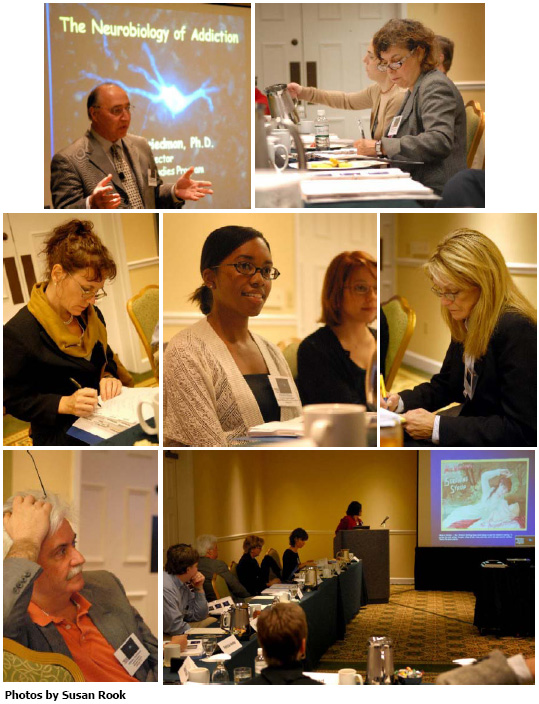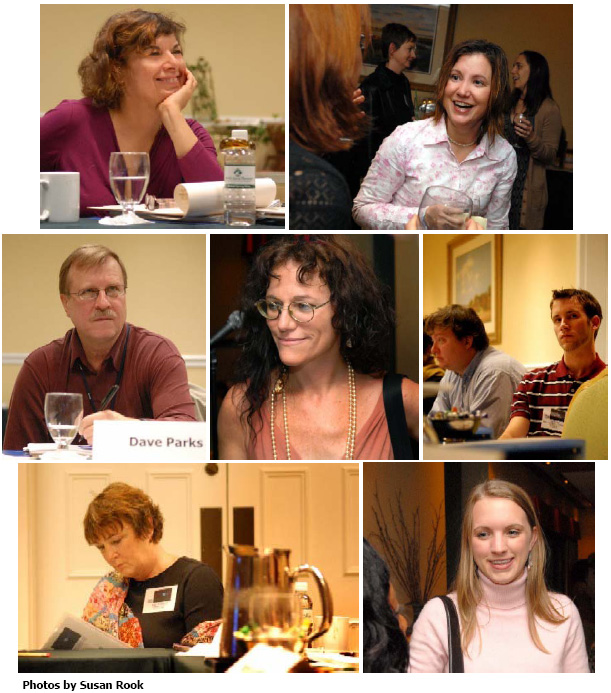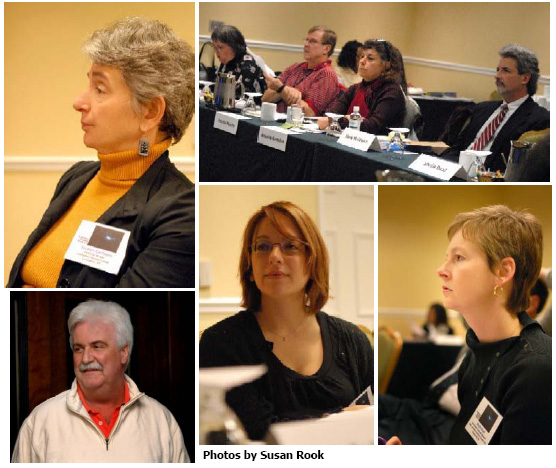
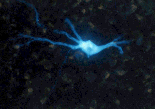
|
|
|
December 2007
Workshop
|
|
Participants
What
Journalists Said
Faculty
Agenda

|
Addiction Studies Program for Journalists Workshop
December 4-5, 2007
Amelia Island, Florida
The December 2007 Workshop of the Addiction Studies Program for Journalists,
held in conjunction with the annual meeting of
The Substance Abuse Policy Research Program of the Robert Wood Johnson Foundation,
was sponsored by Wake Forest University School of Medicine, National Families in Action,
and the Treatment Research Institute.
|
|
|
|
|
|
| December 2007 Workshop Participants |
| |
|
|
Jacalyn Carfagno
Editorial Writer
Lexington Herald-Leader
Lexington, Kentucky
Laura Crimaldi
Sunday Reporter
Boston Herald
Boston, Massachusetts
Cynthia Fox
Science Author & Journalist
Brooklyn, New York
Elizabeth Glover
Graduate Student
Wake Forest University School of Medicine
Medical Center Boulevard
Winston-Salem, North Carolina
William Hathaway
Health Reporter
Hartford Courant
Hartford, Connecticut
Patricia Lynn Henley
Reporter and Freelance Writer
North Bay Bohemian
Santa Rosa, California
Sheila Foote Read
Journalism Graduate Student
University of North Carolina, Chapel Hill
Chapel Hill, North Carolina
Jackie Spinner
Regional General Assignment
The Washington Post
Washington, DC
Judy Kirkwood
Freelance Writer
Fitchburg, Wisconsin
|
|
Annette Kornblum
Medical-Health Writer
Washington, DC
Anthony McLeod
Governor's Institute on Alcohol
and Substance Abuse
Raleigh, North Carolina
Leslie Miller
Executive Producer, Medical News
Ivanhoe Broadcast News
Winter Park, Florida
Patricia Murphy
Announcer/Reporter
KUOW-Puget Sound Public Radio
Seattle, Washington
Dave Parks
Senior Reporter - Health
The Birmingham News
Birmingham, Alabama
Michelle Williams
Journalism Student
University of Maryland School of Journalism
Adelphi, Maryland
Deborah G. Yetter
Reporter
The Courier-Journal
Louisville, Kentucky
David Zell
Program Coordinator
Governor's Institute on Alcohol
and Substance Abuse
Raleigh, North Carolina
|
|
|
What Journalists Said about the December 2007 Workshop
|
On the history of drug abuse and
addiction in the U.S.
--Emotional, colorful, and compelling
introduction, perfect for this program.
--Great way to start the program–-lots of good
info.
--Good, succinct job. Raised question for me of
underlying historical/social trend of hopping
from drug to drug. Does this mean there’s no
solution, only hope for containment?
--Very informative. Loved learning about the
history because I didn’t know where the drugs
come from. The part about heroin in medicine
was particularly interesting. But overall the
presentation was very informative and each
major point flowed well into the next one.
--Good ice breaker.
On preventing adolescent alcohol and
drug abuse
--Very informative–-have not heard “what
works, what doesn’t” addressed in this way
--Great presentation and sense of humor. It
was also very informative.
On introduction to pharmacological terms
--Spectacular–that much of this data was new
was wonderful and highly useful.
--Very interesting.
--Very informative! A great primer for anyone
who covers these issues. The graphics were
especially helpful.
--This is complicated material, but well
presented.
--Since I’m a visual learner, the video was very
helpful. Her presentation was very engaging
and informative.
--Thank you! Thank you!
On the neurobiology of addiction (1)
--Very good overview
--Spectacular—the best talk, it was truly
fascinating to most everyone. The link between
genetics and environment matters immensely,
and this was presented flawlessly.
--Very interesting.
--Good info!
--Very good. Lots of material, but I think I got
most of it, or at least enough to know what to
ask.
--He was great as well. His sense of humor and
use of video were nice touches.
--No improvement needed. Well-polished
presentation.
|
|
--This was really great. I think it was one of my
favorites.
On the neurobiology of addiction (2)
--Great use of contemporary studies.
--Spectacular–-again, the new data was quite
exciting. Many story ideas.
--Good information.
--Great ideas for future stories and excellent
background.
--I can understand why she won the teaching
award.
--Her presentation was, again, very informative
and I like the variety of ways she presented
the information.
--This was perfect. It was fresh, wellpresented.
--Nice handling of a complex subject.
--She’s great. Very effective.
On the personal side of addiction
--Good intro into reality of addiction.
--Certainly emotionally compelling and
revealing on many levels, from the amount
alcoholics drink to the way workplaces turn a
blind eye to this problem.
--Very compelling story.
--This was a moving presentation.
--Her story provided such wonderful insight
into how someone who has had an addiction
coped with life.
--Her story was amazing and she is such a
wonderful speaker.
--Good story.
On the effectiveness of treatment
--Great overview of treatment and most
convincing argument for addiction as a chronic
illness.
--Spectacular, period.
--Lively, engaging, intelligent. Her program
seems quite effective.
--This was absolutely my favorite presentation.
--lots of info, very timely.
--Very good, helpful, well-communicated.
--Great energy, presentation relevant and
informative.
--Her presentation was fun and very
informative too. I really enjoyed learning about
the various methods of treatment and how to
analyze their successfulness. As a result, I
think what I learned here will help me with my
reporting tremendously.
--Good, relevant research.
|
|
On criminal justice issues
--Very interesting, useful.
--An interesting perspective on incarceration
and treatment.
--Very helpful in terms of policy choices, how
to allocate resources, etc.
--The presentation was informative.
--One of my favorites.
--Very interesting.
On co-occurring disorders
--Good topic.
--Very interesting.
--More time. I felt like I wanted more.
--Presentation style is good–engaging
personally.
--His combination of knowledge and sense of
humor made this presentation one of the more
fun ones. I learned much new, which is always
good, and the information will definitely help
with my reporting.
--Very good overall.
On child welfare
--She’s great, formidably intelligent, a
wonderful speaker.
--Really useful and specific information
regarding child welfare.
--The digital video was an excellent touch, and
I liked how she broke down the statistical
information into layman’s terms.
--Really liked presentation of case studies.
On alcohol serving issues
--Great, lively and informative, even amusing.
--Good, very timely info.
--I felt like there was more information on
research methodology than I needed. The
results were very helpful.
--Everything was wonderful.
On scientifically reliable Internet
resources
--Good resources.
--Wonderful, informative and highly useful.
--Simple, clear. Very helpful.
--Very helpful info!
--Great to have–-might be nice to send as
email, which would make it easy for bookmarking
these sites.
--Excellent presentation. So informative
recommend putting at beginning, not end of
program—place sessions in sequence, not by
speaker.
--Good tips. Have participants provide links.
|
|
Overall Impressions
--I was impressed with how condensed and
specific most info was.
--I wanted to learn more and felt like it
certainly succeeded.
--Excellent overall–-content to good slides.
Appreciated authority, enthusiasm, and
receptivity of speakers to questions. Very
sophisticated and user-friendly presentations.
--Lots of story ideas and statistics to use in
stories.
--This was great and very timely. I look
forward to using your experts as sources.
--Some very good ideas on addiction as a
chronic illness.
--Truly wonderful program, multifaceted, well
integrated, incredibly well organized.
--Gave me a number of ideas and sources.
--A lot of background info provided will be very
helpful–-also I now have access to new
resources I was unaware of.
--Information quality is critical in my business
and this was a wonderful source.
--I think this knowledge will put me ahead of
many in my field.
How participants think the workshop will
help them with their reporting on
substance abuse
--I have more ideas about how to present a
serious issue for my state in news stories.
--I have a broader understanding of addiction
issues, as well as some controversial areas.
--I write editorials. This will give me a broad
base and more sources for good research, as
well as contacts to call on.
-- I am much more in touch with topical issues
and critical research.
--Clearly it will provide depth to my reporting.
-- I have about 40 ideas for books and stories.
I will obviously cut this down.
--During the 2008 legislative session advocates
plan to ramp up efforts to get more funds for
mental health/substance abuse treatment.
This gives me some ideas for coverage.
--Made me more aware of advances being
made in various areas, especially the genetic
basis of addiction.
--I’m constantly amazed at how much public
perception lags behind current research.
--I found the neuroscience presentations the
most useful in expanding my knowledge.
--Did not know much about neurobiology
issues as key component of addiction.
--Good public service.
|
|
What participants liked best about the program
|
--Very well put together and organized.
--Neuroscience.
--Genetic basis of addiction.
--Graphics in presentations and exchange of
information, dialogue on key issues.
--Presentations by Dr. Friedman, Dr. Schwartz-
Bloom, and Dr. Carise.
-- Learning from experts about what’s currently
going on in research, up-to-date results. Great
overview. Internet resources are AWESOME.
--The presentation topics because they were
very thorough and the speakers. Every
speaker presented the information in a fun way
and was kind enough to break the information
down into layman’s terms.
|
|
--Day 1 overview presentation. Dinner speaker
was great.
--I think the contacts with experts are so
valuable and will really help with my reporting.
--Truly great program. Thank you.
--Might be helpful to take to regions and invite
journalists from surrounding states (and
perhaps policy makers).
--Keep on offering it. A very high quality,
professional program. I will be using this
information for a long time to come. I also
appreciated the opportunity to meet and
develop connections with leaders in this field.
--Good job. You guys know what you are
doing.
|
|
|
|
December 2007 Workshop Faculty |
David Friedman, PhD
Director, Addiction Studies Program
Deputy Associate Dean and Professor
Wake Forest University School of Medicine
Department of Physiology and Pharmacology
Winston-Salem, North Carolina
Sue Rusche
Co-Director, Addiction Studies Program
President and CEO
National Families in Action
Atlanta, Georgia
Deni Carise, PhD
Treatment Research Institute
Philadelphia, Pennsylvania
Kevin Knight, PhD
Research Scientist
Institute of Behavioral Research
Texas Christian University
Fort Worth, Texas
Mark P. McGovern, PhD
Associate Professor of Psychiatry and
Community and Family Medicine
Dartmouth Medical School
Lebanon, New Hampshire |
|
Cathleen Otero
Deputy Director
National Center on Substance Abuse
and Child Welfare
Irvine, California
Chris Ringwalt, PhD
Senior Research Scientist
Pacific Institute for Research and Evaluation
Chapel Hill, North Carolina
Susan Rook
Photographer, Journalist, and Recovery
Advocate
Manassas, Virginia
Rochelle “Shelly” Schwartz-Bloom, PhD
Professor of Pharmacology
Duke University Medical Center
Dept. of Pharmacology & Cancer Biology
Durham, North Carolina
Traci Toomey, PhD
Associate Professor
Division of Epidemiology & Community Health
University of Minnesota
Minneapolis, Minnesota
Prabhu Ponkshe
Director of Communications
Substance Abuse Policy Research Program
of the Robert Wood Johnson Foundation
|
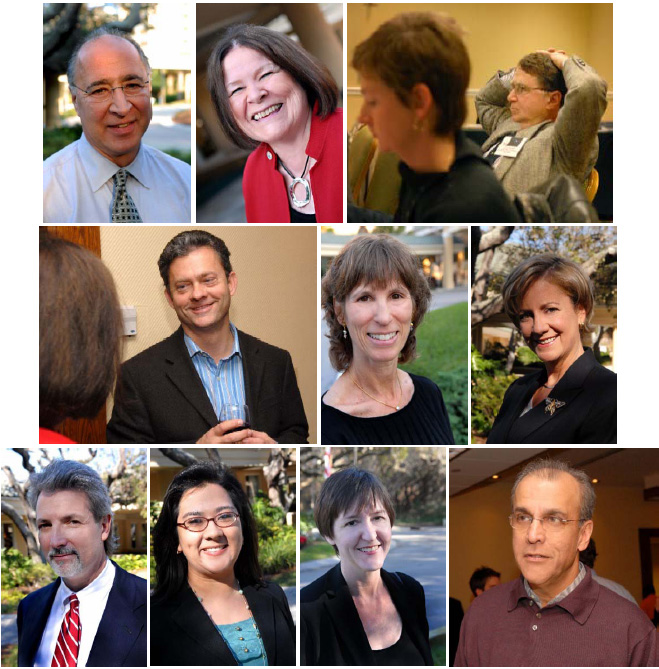
|
|
December 2007 Workshop Agenda
|
Tuesday, December 4
8:00 a.m.
Continental Breakfast
8:30 a.m.
Welcome and Introductions
David Friedman and Sue Rusche
8:45 a.m.
A History of Drug Abuse and Addiction in the U.S.
Sue Rusche
9:45 a.m.
Preventing Adolescent Alcohol and Drug Abuse
Chris Ringwalt
11:15 a.m.
Break
11:30 a.m.
Introduction to Pharmacological Terms
Shelly Schwartz-Bloom
12:30 p.m.Lunch
1:30 p.m.
The Neurobiology of Addiction
David Friedman
3:00 p.m.Break
3:15 p.m.
The Neurobiology of Addiction II
Shelly Schwartz-Bloom
4:45 p.m.
Evaluations
5:00 p.m.
Adjourn
6:00 p.m.
Reception
6:30 p.m.
Dinner
Dinner Speak
|
|
Wednesday, December 5
7:30 a.m.
Continental Breakfast
8:00 a.m.
Does Treatment Work?
Deni Carise
9:30 a.m.
Break
9:45 a.m.
Criminal Justice Issues
Kevin Knight
11:15 a.m.
Co-Occurring Disorders
Mark McGovern
12:15 p.m.
Lunch
1:15 p.m.
Substance Abuse and Child Welfare:
An Overview of the Issues
Cathleen Otero
2:45 p.m.
Break
3:00 p.m.
Alcohol Serving Issues
Traci Toomey
4:00 p.m.
Scientifically Reliable Internet Sources
Sue Rusche
4:30 p.m.
Evaluations
5:00 p.m.
Adjourn
Thursday, December 6
9:00 a.m.
Announcement of 2007 Addiction Studies
Program Award
Opening Session of the Annual Meeting
Substance Abuse Policy Research Program
of the Robert Wood Johnson Foundation |
| |


